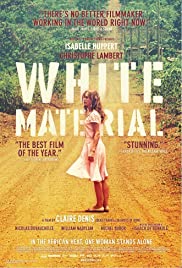
WHITE MATERIAL
France, 2009, 106 minutes, Colour.
Isabelle Huppert, Christophe Lambert, Isaach de Bankole, Nicolas Duvauchelle, William Nadylam, Michelle Subor.
Directed by Claire Dennis.
French director Claire Denis spent much time in Africa and her first feature film, Chocolat, is a portrait of unrest in an African country. She also made a documentary about Camaroun music, Man No Run.
After returning to Paris, she made a great number of French films, some very direct, some more esoteric and arthouse (especially L'Intrus). However, she was strong on relationships in such films as Trouble Every Day and Friday Night. She also made a film about soldiers in East African Djibouti. African characters also appear in such films as 35 Rhums.
With White Material, she returns to a contemporary Africa, torn by civil war. She focuses on a colonial family and the Africans turning against them. She also shows the ineffectual nature and the violence of the African rebels.
The film has a very strong cast, with Isabelle Huppert as the mother (not entirely dissimilar from her role in the film of Marguerite Duras’ The Sea Wall). Christopher Lambert plays her husband, Nicolas Duvauchelle plays her discontented son.
The film has a very strong atmosphere, is insightful into the situation in post-colonial and contemporary Africa.
1.Claire Dennis and her films, the background of Africa, used in her past films? Memories of the past, exploration of the present? Her African, French and female perspective?
2.The location photography, the plantations, the roads, mountains, the village and shops, the interiors of the house, the plant? The musical score?
3.The title, the reference to the gold cigarette lighter, to the colonialists and their descendants?
4.A film on colonialism, the facts, the effect of colonialism, on the whites, on the blacks, on land and property, on the treatment of the natives, resultant angers, rebellion, the role of the army, the rebels, the French army? Insights into the results of colonialism?
5.The framework: Maria, running, hiding from the vehicles, getting on the bus, remembering what had happened in the previous days, seeing the aftermath?
6.The introduction to The Boxer, the men finding him dead, his status, figurehead, the image on the wall, the young children travelling to join his rebellion, the rebels, his hiding in the house, his wound, his death? Christine telling the mayor?
7.The French forces, the helicopter, warning Maria, dropping the survival kits from the helicopters? Her decision to stay, her anger? The reaction of the workers and their leaving, the servants from the house? Her father-in-law, his age, illness? Her protectiveness of her lazy son? The divorce from her husband? Going to town, paying the hundred dollars to get through the road block, identifying those at the road block as teachers and relatives of the workers? In the pharmacy, their wanting cash, her being able to hire the men, returning in the truck with them?
8.Maria and her obsession, her belonging to Africa, the past, the land, her being determined, her marriage, her son, her husband’s other son? Picking him up at school? Seeing her husband’s bike in the town, questioning him about the mayor?
9.The work, the men in the fields, the baskets of coffee beans, into the water, the generator and breaking down, Maria touching the coffee beans, her love for them? The Africans and their mocking the reputation of the coffee?
10.Andre, alienated from Maria, having another son? His love for both sons? Seeing him with the mayor, selling the plantation, their discussions, the debts, the mayor and his shrewdness? Going home, the encounters with his sons? The shots, going to find Manuel? The clash with him? Maria finding him dead?
11.Manuel, surly, not wanting to get up, his mother’s prodding him? His following the thieves from his room? Cutting his hair, their robbing him, stripping him? His rescue? The return and his attack on the girl? Shaving his head, getting the machete, joining the rebels, joining in the killings, the stealing of the pills from the pharmacy, indulging in them, his death, the fire, his mother discovering his skeleton? Maria not understanding him at all, thinking he needed protection? The contrast with the other boy, at home, his cutting the power lines?
12.Maria and the night, the process of making the coffee, the discussions with Jean-Marie?, his saying he was too old to leave, her agreeing? The men leaving in the morning, wanting their pay, the empty safe? Going to town, the confiscation of the truth? Going to the pharmacy, the attendants(*??) dead? Her escape in the bus?
13.Her father-in-law, her getting the machete, suddenly killing him – why? The shock value?
14.The portrait of the rebels, the children, their immaturity, guns, souvenirs, boys and girls, stealing the pills, indulging in them, their being killed? The presentation of the rebel soldiers? The army soldiers and their attitudes, behaviour?
15.Insights into the past, present and future of Africa?